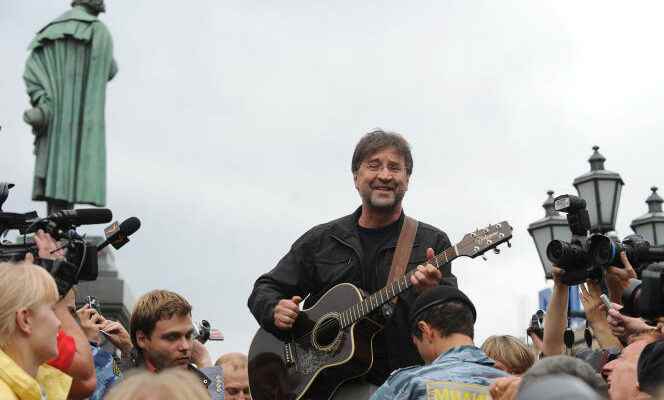A free spirit blacklisted by Moscow. Considered one of the greatest contemporary Russian songwriters, Yuri Shevtchouk, 65, was sentenced on Tuesday, August 16, to a fine for his remarks deemed critical of the Kremlin. The singer of the famous rock group DDT is accused by justice of having discredited the Russian army, after denouncing the invasion of Ukraine and disavowing President Vladimir Putin during a concert.
“The homeland is not to be the president’s permanent ass-licker”, he had hammered in front of his audience, during a concert organized on May 18 in Oufa, a small town in western Russia, to the applause of the room. “Now people are being killed in Ukraine, why? Our guys are dying in Ukraine, why? (…) Because of the Napoleonic plans of our Caesar”, he lamented. The concert ended, the police officers who came to question him in his dressing room had drawn up a report for him, had then reported his producer on instagram.
” I have never betrayed the fatherland nor my convictions on peace »
Convicted of“public action intended to discredit the use of Russian armed forces”the pioneer of Russian rock was therefore sentenced to a fine of 50,000 rubles (800 euros) by a court in Ufa, his hometown which he had left in the 1980s for Leningrad (Saint Petersburg), thus forming the DDT group.
The fine imposed seems to serve as a warning, because Russian criminal law provides in this case for penalties of up to fifteen years in prison, especially in the event of a repeat offence. However, in this matter, the rocker is not at his first attempt.
By February 27, “all happy songs” had been removed from the lineup
Shortly before the outbreak of the Russian invasion in Ukraine, the singer already said he feared for ” peace in the world “. Three days after the start of the conflict, Yuri Chevtchouk took the stage on February 27 to make his voice heard in Tula, a Russian industrial city. “You have known me for forty years… I have never crushed myself in front of superiors, I have never betrayed my country or my convictions on peace and love… But what can I do? We must talk to each other, person to person… No to war! » During this concert, “all the happy bits” were removed from the schedule.
Two months later, on April 21, his rock group DDT refused to perform in a hall in Tiounmen, because of the presence of the letter “Z”, emblem of exacerbated Russian patriotism. “The situation has worsened in Russia, to such an extent that we can no longer remain neutral. We absolutely have to support” Russia in this conflict, explains Anna Zaytseva, lecturer in Russian language and civilization at the University of Toulouse-II Jean-Jaurès. “More than thirty artists and groups, of all styles, appear today on lists whose concerts have been banned. Unofficially, but the rooms are complying with it”she says.
A “moral conscience” of Russian rock
Like the concerts of Akvarium, Boris Grebenchtchikov’s flagship rock group − who lives in London but whose other members have remained in Russia −, and those of Machina Vremeni, the first Russian rock group founded by Andreï Makarevitch – now based in Israel – all DDT dates have been canceled in Russia. According to Anna Zaytseva:
“All three are part of the same generation of rockers who broke through on the big stages during Perestroika and Glasnost (…) and who took open positions against the war. »
A period during which their deeply anti-system songs are a hit.
It was not until 1991, with the fall of the USSR, that Yuri Chevtchouk asserted himself as a rock icon in Russia. From a musical point of view, the artist himself refers to the singer, “bard” Soviet Vladimir Vysotski, with texts describing society in a satirical way and addressing patriotism, opposition to war and the rejection of all violence, in particular. “He is part of the pantheon of Russian rock”, of which he is “moral conscience” believes researcher Anna Zaytseva, author of a article on the legitimation of Russian rock in the USSR in the 1970s and 1980s.
Regarding his texts, “You always have to read between the lines”advises Olga Shabelnikova, historian specializing in Russia and attached to the University of Strasbourg. “He always had things to say and always did, especially through his songs”, she recalls. Appreciated for his rock with folk accents, the author of the titles Nié streliai (” Dont shoot “, 1980, written following the return to the country of the first Russian coffins during the war in Afghanistan and which will quickly become a pacifist slogan), but also ofFall (1992) and the hit Lyubov (“Love”, 1996), remains to this day ” famous “as well as’“loved and listened to” in Russia.
Due to the war in Ukraine, when many Russian artists had to leave their country, Yuri Chevtchouk still remains a conscientious objector. “He sees this as a civic duty”, underlines Anna Zaytseva. A duty that has already led him in the past to fight against the first war in Chechnya in the early 2000s, to give an “anti-war” concert in 2008 in tribute to the victims of the conflict in Georgia and to call for the liberation opponents imprisoned in Belarus. He was also, among other things, one of the leaders of a vast protest movement harshly repressed in Russia, against the return of Vladimir Putin to the Kremlin in the winter of 2011-2012.
The rocker, who did not attend his hearing on Tuesday due to Covid-19, sent a written statement through his lawyer Alexandre Peredrouk. In it, he emphasizes having “always been against war, in any country and at any time”.
